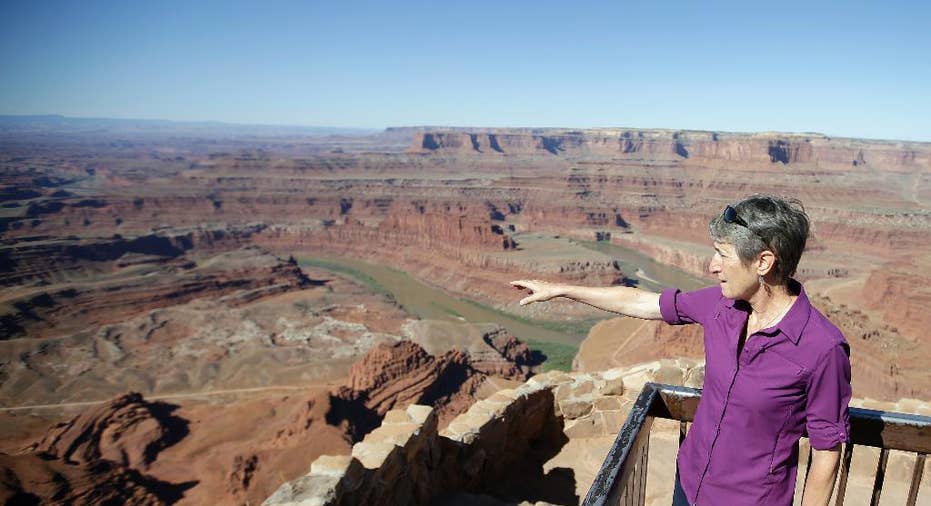Obama names Utah, Nevada monuments despite GOP opposition

SALT LAKE CITY – President Barack Obama designated two national monuments Wednesday at sites in Utah and Nevada that have become key flashpoints over use of public land in the U.S. West, marking the administration's latest move to protect environmentally sensitive areas in its final days.
The Bears Ears National Monument in Utah will cover 1.35 million acres in the Four Corners region, the White House said. In a victory for Native American tribes and conservationists, the designation protects land that is considered sacred and is home to an estimated 100,000 archaeological sites, including ancient cliff dwellings.
It's a blow for state Republican leaders and many rural residents who fear it will add another layer of unnecessary federal control and close the area to energy development and recreation, a common refrain in the battle over use of the American West's vast open spaces.
In Nevada, a 300,000-acre Gold Butte National Monument outside Las Vegas would protect a scenic and ecologically fragile area near where rancher Cliven Bundy led in an armed standoff with government agents in 2014. It includes rock art, artifacts, rare fossils and recently discovered dinosaur tracks.
The White House and conservationists said both sites were at risk of looting and vandalism.
"Today's actions will help protect this cultural legacy and will ensure that future generations are able to enjoy and appreciate these scenic and historic landscapes," Obama said in a statement.
His administration has rushed to safeguard vulnerable areas ahead of President-elect Donald Trump's inauguration. It has blocked new mining claims outside Yellowstone National Park and new oil drilling in the Arctic Ocean. Obama's creation and expansion of monuments covers more acreage than any other president.
But Trump's upcoming presidency has tempered the excitement of tribal leaders and conservationists, with some worrying he could try to reverse or reduce some of Obama's expansive land protections.
Utah's Republican senators vowed to work toward just that.
"This arrogant act by a lame duck president will not stand," U.S. Sen. Mike Lee tweeted about Bears Ears.
Sen. Orrin Hatch said Obama showed "an astonishing and egregious abuse of executive power" and that "far-left special interest groups matter more to him than the people who have lived on and cared for Utah's lands for generations."
Christy Goldfuss, managing director of the White House Council on Environmental Quality, said the Antiquities Act that allows a president to create monuments does not give a president authority to undo a designation, a rule the courts have upheld. She acknowledged that Congress could take action, though.
Opponents agree the area is a natural treasure worth preserving but worried that the designation would create restrictions on oil and gas development as well residents' ability to camp, bike, hike and gather wood.
New mining or energy development will be banned, but existing operations won't be affected, federal officials said. Wood and plant gathering is still allowed as well as hunting, fishing and other recreation, they said.
Members of Utah's all-GOP congressional delegation had backed a plan to protect about 1.4 million acres at Bears Ears, while opening up other areas of the state for development.
The boundaries of the monument are roughly based on that plan and significantly smaller than what a coalition of tribes had sought.
But Navajo Nation President ?Russell Begaye called it an exciting day for his tribe and people of all cultures.
"We have always looked to Bears Ears as a place of refuge, as a place where we can gather herbs and medicinal plants, and a place of prayer and sacredness," Begaye said. "The rocks, the winds, the land — they are living, breathing things that deserve timely and lasting protection."
The Navajo Nation is one of five tribes that will get an elected official on a first-of-its-kind tribal commission for the Bears Ears monument. The panel will provide federal land managers with tribal expertise and historical knowledge about the area, federal officials said.
Tucked between existing national parks and the Navajo reservation, the proposed monument features stunning vistas at every turn, with a mix of cliffs, plateaus, towering rock formations, rivers and canyons across wide expanses covered by sagebrush and juniper trees.
In Nevada, retiring Democratic U.S. Sen. Harry Reid pushed for protections at Gold Butte, a remote area northeast of Lake Mead, but GOP members of the state's congressional delegation have been vocal opponents.
The "designation is a wonderful capstone to a career of fighting to protect Nevada's pristine landscapes," Reid said in a statement.
Republican Nevada Sen. Dean Heller expressed disappointment, saying land designations should be done by Congress and not by presidential decree.
___
Associated Press writers Michelle L. Price in Salt Lake City and Michelle Rindels in Las Vegas contributed to this story.



















